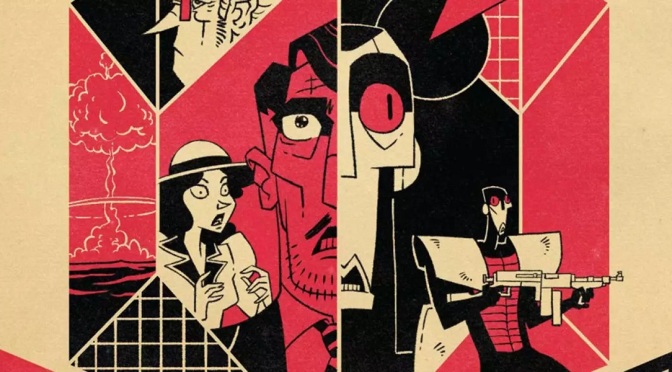Graphic retelling of Karel Čapek’s 1921 sci-fi tale will launch at DeeCon this month
The century-old play that first gave rise to robots as a cultural phenomenon gets a makeover as a comic book
By Mark Cantrell

ROBOTS are everywhere these days.
Often the villain, occasionally the hero, these machines are a staple of science fiction. We find them in books, we see them on screens large and small: a warning to beware humanity’s darkest nature in ‘tin man’ form.
The real thing is a little more prosaic, cutting-edge robotics research notwithstanding: factory robots keep manufacturing moving; software robots manage the flows of everyday life, automating the mundane on our behalf; they watch over us and they curate our experiences.
Sometimes they stand as surrogates for a lack of human contact; they are a way for us to see ourselves and it’s not always a pleasant view.
Down in the darkness of our fears, we perceive in the robot a truth in ourselves: we are the machine.
We might consider Mary Wollstonecraft Shelley’s Frankenstein as the mother of all this dark invention, but hers was a work concerning life, its creation, and what it means to be human.
Certainly the themes contained within this gothic tale haunt our dealings with our robot creations, especially when it comes to artificial intelligence. However, it’s fair to say the trope of the machine subsuming or superseding its creators has a rather more recent origin.
It was in a theatre, under the limelight of the stage, that the robot as we know it was created. Now that century-old play has been adapted into comic book form to bring the story to a new audience.
R.U.R: Rossum’s Universal Robots was written in 1920 by Czech writer and playwright, Karel Čapek and it was first staged in 1921. The science fiction play is considered one of – if not the – first to introduce machines with at least a degree of artificial intelligence: it also gave the English language the word ‘robot’ and the first robot apocalypse.
In the play Helena is a representative of the League of Humanity, a group which seeks freedom for the robots. She visits the factory that produces the machines and meets the managers and chief scientists. She is appalled by their attitude towards their creations. A decade passes and new experimental robots are produced, but humanity is in decline and a war with the robots leads to the extermination of the human race.
Right from the start, then, we see how Čapek introduced not only the concept of the robot, but the trope of humanity’s hubris and its doomed relationship its ‘offspring’. For all that these themes have played out endlessly in fiction ever since, the playwright’s work remains very much relevant to our modern world.
Professor Christopher Murray, director of the Scottish Centre for Comics Studies, and chair of comics studies at Dundee University’s School of Humanities, certainly thought so. He describes the play as an “oddly compelling mix of satire, science fiction, comedy and tragedy”.
He has collaborated with comics artist – and graduate of the university’s Comics Masters programme – Nick Johnson to create a new comic book adaption of Čapek’s play. The publication will be launched at DeeCon in Dundee on Saturday, 9 April.
“It’s a play about being trapped by the roles that others set for us,” said Murray, who wrote the script. “Society is a machine that produces beings every bit as programmed and restricted as the bio-mechanical robots that emerge from the factories. When I read this, I was amazed that there were not more adaptations of this story, and so set about to create one in the form of a comic.”
So, the robots are coming. While we wait, there’s a taster to explore so we can see what our new machine overlords have in store. See it below.
MC
Thanks for taking the time to read this post. For the price of a cup of coffee you’d not only be showing your appreciation of the writer’s efforts, but also helping to support an indie author in these difficult times. Drop by Ko-Fi to make a donation, or if you prefer you can use PayPal.Me. Thanks in advance for your support. It is gratefully received.

